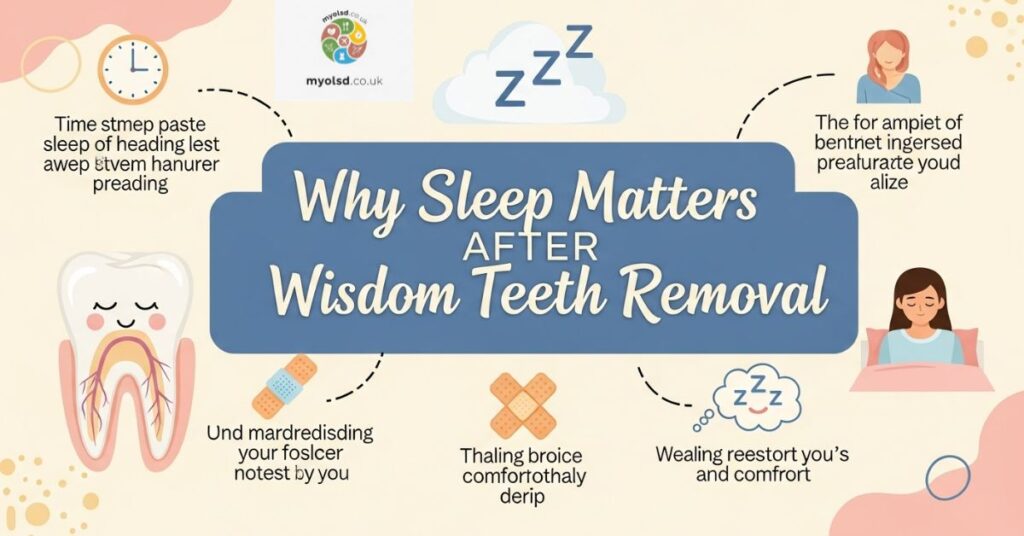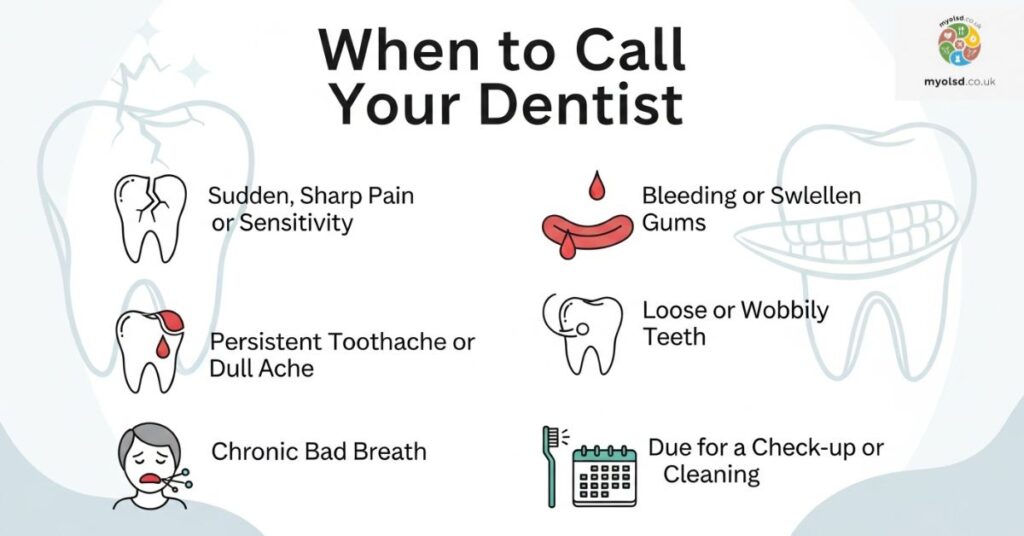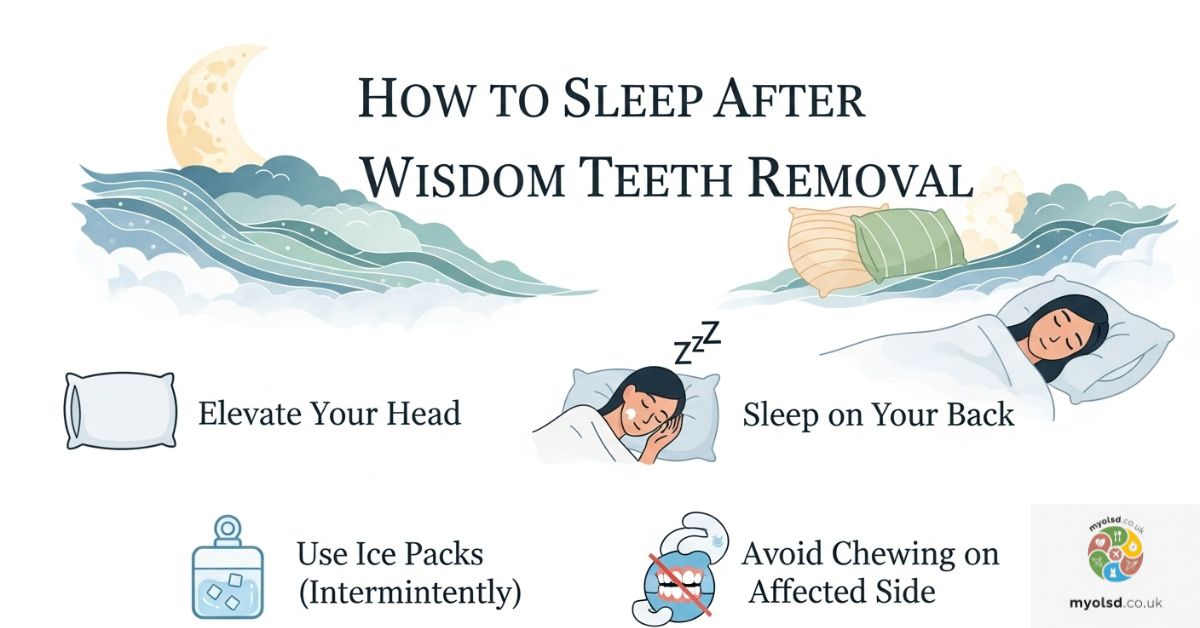Getting rest after wisdom teeth surgery can feel almost impossible. You’re tired, in pain, and every position seems uncomfortable. Lying down makes the swelling worse, and you probably keep wondering, “How on earth am I supposed to sleep after wisdom teeth removal without making it worse?” If that’s you right now, you’re definitely not alone.
In this post, we’ll walk through simple, practical tips on how to sleep after wisdom teeth removal so you can recover smoothly and wake up feeling better. From the best sleeping positions to helpful do’s and don’ts, you’ll find exactly what you need to make your nights easier and your healing faster.
Why Sleep Matters After Wisdom Teeth Removal

Following a tooth extraction, your body requires sufficient rest and energy to heal properly. Sleep is essential during this time; it’s when your body repairs tissues, reduces swelling, and strengthens immune function. Lack of proper sleep can lead to:
- Slower healing
- Increased swelling and pain
- Higher chances of complications like dry socket
This is why your post-surgery care should focus not only on pain relief and oral hygiene, but also on improving your sleep quality.
Read more Article:Top Reasons Why Soccer Is the Best Sport Loved Worldwide
1. Choose the Right Sleeping Position
Your head position after surgery plays a big role in recovery. Sleeping flat can cause blood to pool around the surgical site, which increases swelling and discomfort. Instead:
- Keep your head elevated. Use extra pillows or a wedge pillow to position it slightly above heart level.
- Sleep on your back or side. This prevents putting pressure on the jaw.
- Avoid sleeping on your stomach. It can strain the jaw and neck.
Correct positioning can ease pain, minimize bleeding, and help blood clots form, protecting the extraction site.
2. Remove Gauze Before Sleeping
Your dentist may place gauze on the surgical area to manage bleeding for the first few hours. However, never sleep with gauze in your mouth; it’s a choking risk and could cause you to swallow blood.
Best approach:
- Keep gauze in place for 30 to 45 minutes after surgery, replacing it if needed.
- Remove it before bedtime once bleeding slows.
- If bleeding persists, stay upright for a while instead of lying down.
3. Manage Pain Before Bedtime
Post-extraction soreness is common and can make sleeping difficult. To improve comfort:
- Take prescribed painkillers or over-the-counter options like ibuprofen as directed.
- Apply an ice pack to the jaw for 10 to 15 minutes at a time during the first day.
- Avoid aspirin, as it can thin the blood and increase bleeding.
Good pain control reduces restlessness and helps you sleep without disturbing the healing site.
4. Keep a Cool, Relaxed Sleeping Environment

The right bedroom setup can help you sleep better and recover faster:
- Keep the temperature between 65–68°F (18–20°C) to help reduce swelling.
- Use blackout curtains or an eye mask to block light.
- Try white noise if you’re sensitive to sounds.
A calm environment supports deeper, uninterrupted sleep, vital for healing.
5. Avoid Staying Up Late
Your body’s peak repair time is between 10 pm and 2 am. Staying up late can slow recovery. To maximize healing:
- Maintain a regular sleep schedule.
- Limit screen use to 30 minutes before bed.
- Try relaxing activities before sleep, like gentle stretching or breathing exercises.
6. Things to Avoid While Sleeping After Wisdom Teeth Removal
To reduce the risk of complications:
- Don’t lie completely flat during the first few nights.
- Avoid falling asleep with food or drink in your mouth.
- Skip heat packs for the first 24 hours heat increases swelling.
- Avoid alcohol before bed, as it slows healing and interacts with medication.
7. When to Call Your Dentist

Some discomfort is normal, but you should contact your dentist or oral surgeon if you experience:
- Severe pain not relieved by medication
- Ongoing bleeding after 24 hours
- Fever or chills
- Pus or foul taste in your mouth
These symptoms may signal infection or another problem needing prompt care.
Final Thoughts on How to Sleep After Wisdom Teeth Removal
Sleeping well after surgery is not just about feeling comfortable; it’s a crucial part of recovery. By keeping your head elevated, removing gauze before bed, managing pain, and sticking to a healthy sleep routine, you can heal faster and avoid setbacks.
Always follow your dentist’s guidance and pay attention to your body. A few nights of mindful sleeping can make a big difference in your healing journey.
FAQS
1. How do I need to sleep after wisdom teeth removal?
Lie on your back with your head propped up to help reduce swelling.
2. What position should I sleep in for tooth extraction?
Sleeping on your back with extra pillows supporting your head is the safest option.
3. Can you sleep with gauze in your mouth?
No, always take the gauze out before sleeping to prevent the risk of choking.
4. Why does wisdom teeth removal hurt more at night?
Discomfort increases at night because lying flat boosts blood flow and pressure in the area.


sleep after wisdom teeth removal so you can recover smoothly and wake up feeling better. From the best sleeping positions to helpful do’s and don’ts, you’ll find exactly what you need to make your nights easier and your healing faster.